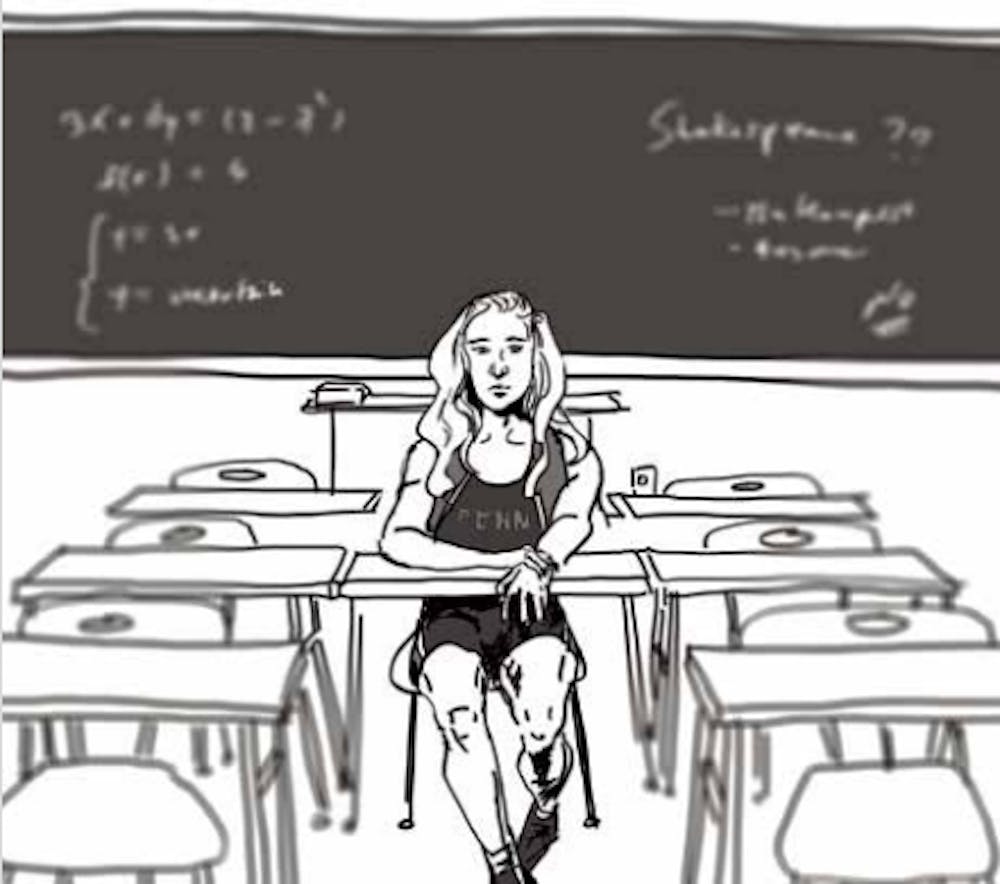Walking into my first class of freshman year, I did my best to wash away any affiliation I might have with Penn Athletics. After an early morning rowing practice, I ran back to my room in the Upper Quad to transform my reeking, dirty, post–workout self into a more suitable first–day–of–school self. In the twenty minutes I had to prepare myself before my 10 a.m. lecture, I switched my athletic identity for my student identity. I showered, brushed and concealed anything that might give me away as a Penn Rower.
The truth is, being recruited to Penn made me feel guilty. Who’s to say that my athletic capabilities should overwrite the academic capabilities of another non–athletic applicant? I justified my Penn acceptance by telling myself that the college process is just a game. High school classmates that graduated before me proved that a 2400 SAT score and a 4.0 GPA were simply not enough to get into a school like Penn. Regardless of how smart you are, admissions is not an even playing field—legacies rely on the names of parents and grandparents, wealthy students bribe their way in and athletes rely on their physicality. Brains don’t guarantee acceptance into a good school, but the reality is that athletic prowess combined with decent academic achievements can. My decision to be recruited to Penn was me playing my straight flush. If an acceptance letter marks the end of the college admittance game, it was fair to say that I’d won.
But after stepping on campus for the first time in the sweltering August heat, I was consumed by my fear of inadequacy. What if I’d gotten so caught up playing the college admissions game that I’d merely played myself? What if I wasn’t smart enough to compete with Penn students in the classroom? What if I wasn’t good enough at rowing, the sport I’d learned to love in high school?
I was afraid that my classmates would doubt my academic capabilities if they knew I was an athlete. I was afraid that I wouldn’t reach the potential that I expected of myself. So, I decided to commit to two different Penn identities— student and athlete. During my classes, I’d be one among many other Penn students. In September, I refused to wear my Penn Athletics clothing to class. I made sure to sit with non–athletes during my lectures, despite the temptation of familiar faces.
During practice, I committed to my team. I did my best to make my boat faster, to outpace everyone else. I needed external verification to validate my place at Penn, whether it came in the form of winning races or acing tests.
By the end of September, I wasn't doing either. I was tired of making vague excuses to my non–athlete friends in class about my mysterious early morning commitments, my constant hunger and my fatigue (which, thankfully, they could identify with). Changing out of my Penn Athletics clothing after every practice started to feel unnecessary. After all, if the kids I studied with during class were my friends, why did I care so much about the possibility that they might label me stupid? After three weeks of consciously concealing my athletic life, I gave up. When I told my classmates I was on the crew team, I was surprised to find that they did not care—“Oh, really? That’s cool!”—was about all I got.
There’s a reason that we call ourselves student–athletes—neither half of the hyphenation is meant to stand on its own. I’m proud to call myself a member of the Penn Women’s Rowing family, but I’m also infinitely grateful to be able to call myself a Penn student. Neither my identity nor my life is meant to be split up into compartments of sport–related activities and academics. Some of my closest friends at Penn are on the Rowing team, but I would also never give up on the relationships I’ve made through classes and living on an integrated hall.
As for whether I belong at Penn or not, I could not have asked for a better group of empowering people to surround me. Life isn’t always sink or swim—sometimes we all need a friend to help us ride the current. So, my advice to myself, and to you, is to trust that you belong no matter what you wear or who you sit with in class.
(illustration by Gloria Yuen)

